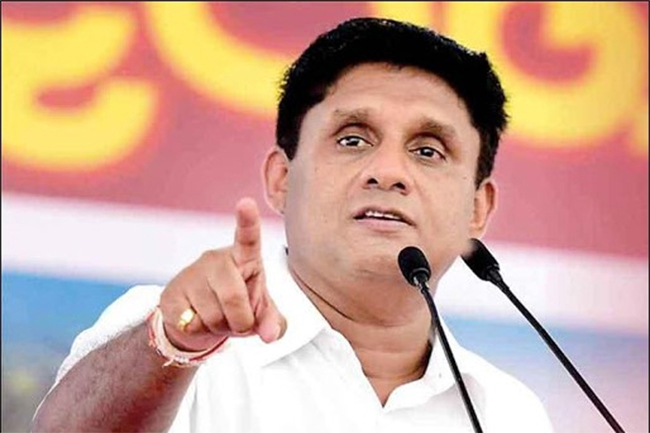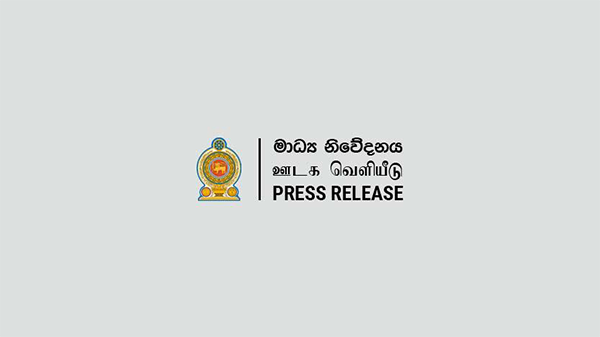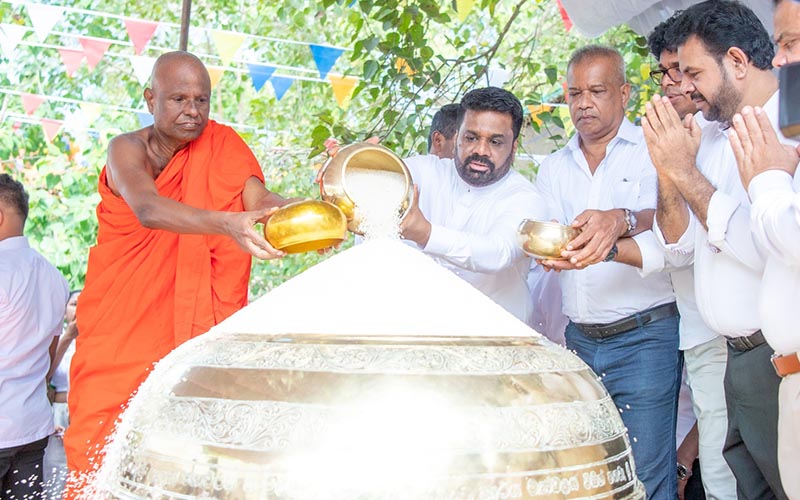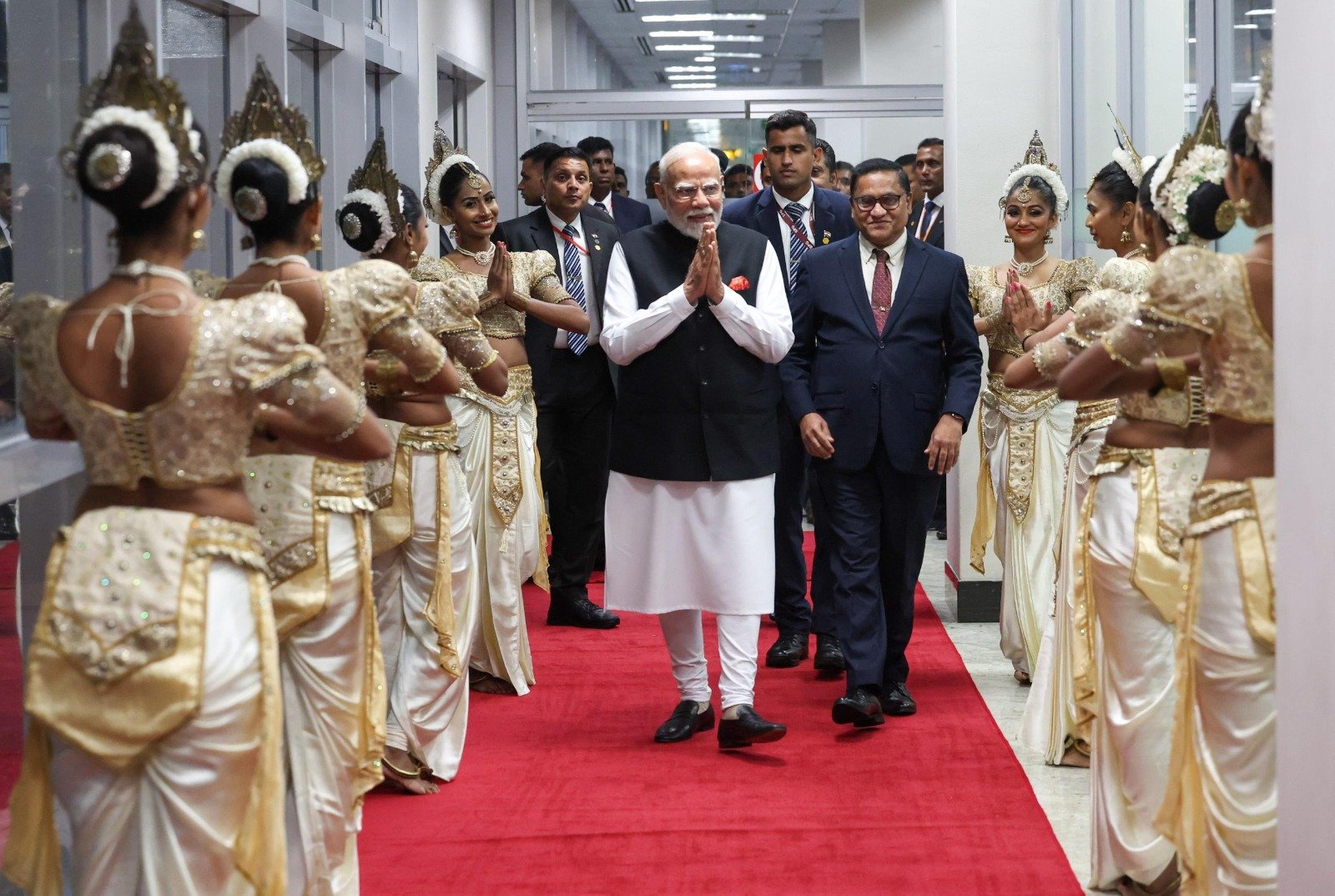News
Sajith defends progressive taxation, highlights inequality

ECONOMYNEXT –Days after he lambasted the government for its tax policy, Sri Lanka opposition leader Sajith Premadasa defended progressive taxation noting a serious income inequality in the crisis-hit South Asian nation.In a meeting held in Kandy with the city’s business community, Premadasa said the main opposition Samagi Jana Balawegaya (SJB) has a team of politicians who are experts on economic policy formulation.
“There is serious imbalance (inequality) in our country. Eighty percent of our tax revenue is from indirect taxes. The remaining 20 percent is through progressive taxation where the tax paid increases as income rises,” said Premadasa.
Progressive taxation is fair and equitable, he said.
“What we first need to do is correct this imbalance. We have practical economists with us. There needs to be politicians who understand monetary policy, tax policy and all national policies. The politician cannot be subservient to the advice of officials alone.
“Our political team is one that possesses great knowledge of economic policy,” he added.Speaking at an election rally in Thambuttegama on February 12, the SJB leader criticised the government for its income tax hike.
“The ali pohottu kaputu government is burdening the people with taxes. We hear they’re planning to impose a tax on people who earn 45,000 rupees a month too. Just great,” said Premadasa addressing a large crowd of SJB supporters.
Premadasa was likely referring to reports that the International Monetary Fund (IMF) had asked the government to impose taxes on anyone who earns above 41,667 rupees a month as a condition for a 2.9 billion US dollar extended fund facility. However, the tax threshold remains at 100,000 rupees a month and there is no indication yet that it will be lowered.At an economic summit organised by the SJB in Colombo on February 14, SJB legislator Harsha de Silva presented the party’s proposals for tax reform under an SJB government.
The MP said the party supports progressive tax and that the highest earners should even pay as 39 percent if not more. He also took a swipe at rival opposition group the National People’s Power (NPP) which recently proposed that the tax threshold be increased to 200,000 rupees a month and the highest tax rate be capped at 24 percent.
The SJB’s Economic Blueprint acknowledges that the government has conducted tax reforms, but in its implementation has imposed too high a burden on Sri Lanka’s middle class, disincentiviseing exporters.
The document noted: Both personal and corporate income taxes have been revised. Personal income tax threshold and slabs were reduced, and marginal tax rates revised upwards. The VAT rate was increased, and the threshold was revised downwards, helping expand the tax net.
However, the revised personal and corporate income tax rates are much higher than in the 2017 Inland Revenue Act. The significant increase in personal income tax via PAYE during high inflation has imposed significant burdens on most professional groups. Tax slabs should be broadened in such a way that professionals (perhaps earning up to LKR 500,000 per month) are subjected to a top marginal tax rate of around 25% with the highest marginal rate going up to around 40% for the very high income earners with a temporary surcharge).
It must be noted that the government’s estimate of LKR 100 bn in PAYE tax collection for 2023 is highly questionable given the recent statements in Parliament by the State Minister of Finance that only 120,965 persons were liable to PAYE tax from over 1.1 mn registrations at the end of 2019. An urgent study must be conducted on this discrepancy and steps must be taken immediately to ensure those who are liable to pay taxes, pay.
Beyond PAY, it is essential that citizens of all walks of life who by various means avoid paying taxes are brought into the tax net. The only way to meet the objective of a genuine and stable increase in taxes is by expanding the base, not by squeezing to the bone the few who pay.
News
Issues arising from the Nilwala Salinity Barrier addressed

A series of short-term measures have been proposed to address the irrigation challenges caused by the Nilwala River Salinity Barrier until a long-term solution is implemented.
During a recent discussion chaired by the Secretary to the Presidential Dr. Nandika Sanath Kumanayake, officials from all relevant ministries and institutions agreed to promptly implement these proposals.
As part of these measures, the sand piled along the riverbanks, which was deposited during the construction of the salinity barrier, will be removed to ensure smooth water flow during floods. The height of the sheet pile barriers on both sides of the salinity barrier will be reduced to facilitate water drainage. Accumulated sand in the riverbed will be cleared, while alternative canal pathways will be cleaned and obstructions removed to improve water flow. Additionally, water pumping stations used to drain excess water from paddy fields will be properly maintained.
To address the drainage issues affecting the homes, lands and access roads of residents of Circle Road, Hittatiya centre, Matara during heavy rains, a few short-term solutions have been proposed. A new drainage system will be developed along Dahanayake Road to divert water from Hittatiya First Milepost to Nupe Ela, replacing the current connection to the canal system along Circle Road. The existing drainage system will be upgraded to increase its capacity.
The drainage capacity along Circle Road will be improved and telecommunication cables currently obstructing water flow in the drainage system will be relocated to a more suitable location. The drainage system from the central section of Circle Road through Handayawatta and along Padiliyawatta Road to Nupe Ela will be expanded, with blockages removed to enhance water flow. Upon obtaining the final land survey map from the local authorities, a decision will be made regarding the existence of a natural canal in the affected area.
Meanwhile, the ongoing study by the University of Peradeniya to identify long-term solutions for the issues arising from the Nilwala Salinity Barrier will be reassessed and reviewed.
Latest News
We are working to stabilize and restructure an economy that was in disarray -President

The National New Paddy Harvesting Festival (Aluth Sahal Mangalya), a traditional annual ceremony of offering the first portion of the freshly harvested Maha season paddy to the sacred Sri Maha Bodhi, was held this morning (04) under the patronage of President Anura Kumara Disanayake at the historic Sri Maha Bodhi premises in Anuradhapura.
The ceremony was organized by the Ministry of Agriculture and the Department of Agrarian Services under the theme “In unison, let us cultivate the land, to build a self-sufficient nation” (අහරින් ස්වයංපෝෂිත දැයක් තනන්නට එක මිටට ගොවි බිමට), following the guidance of the Atamasthanadhipathi, the most Venerable Pallegama Hemarathana Nayaka Thera.
This ritual, which dates back to the era of ancient monarchs, saw the participation of farmers from across the country. In accordance with tradition, they prayed for timely rains and fertile fields and invoked blessings for a self-sufficient and prosperous economy through agriculture.
President Anura Kumara Disanayake first paid homage and received blessings from the sacred Jaya Sri Maha Bodhi before joining the ceremonial proceedings.
The sacred procession, which carried the newly harvested paddy from near the historic Sinha Kanuwa in Anuradhapura, arrived at the sandy courtyard (වැලි මලුව) of the Sri Maha Bodhi, marking the ceremonial commencement of the New Paddy Harvest Festival.
The Most Venerable Pallegama Hemarathana Nayaka Thera commenced the ritual by filling the golden bowl with the new paddy, after which representatives from all provinces added paddy from their respective regions, symbolically filling the golden bowl.
President Anura Kumara Disanayake also participated in this ritualistic moment, amidst the chanting of Pirith by the Maha Sangha.
A vessel of pure bee honey, traditionally offered to the Sri Maha Bodhi, was ceremonially presented to the President by Deputy Leader of the Vedda Community U.W. Bandiyala Eththo.
The vessel of ghee, brought from the historic Saman Devalaya in Sabaragamuwa, was also presented to President Anura Kumara Disanayake, to be used in the customary ghee offering at the Sri Maha Bodhi.
The President also received the commemorative plaque of the National New Paddy Harvest Festival and presented tokens of appreciation to farmer leaders who have made significant contributions to the development of the country’s agriculture sector.
As part of the initiative to secure a pest-free harvest, the President participated in the distribution of pest-resistant seed paddy to farming communities across the provinces.
Addressing the subsequent official ceremony, President Anura Kumara Disanayake stated that the current government is working to transform an economy that was in disarray. He noted that the Paddy Marketing Board is burdened with a debt of Rs. 28 billion, while harvested paddy is being left to spoil in storage.
The President emphasized that the current administration has accepted the responsibility of restoring and restructuring this disorderly system. He added that the government expects the support not only of the state machinery related to agriculture but also of all farming communities. He affirmed the intention to integrate Sri Lanka’s cultural and traditional systems to reclaim the legacy of the agricultural economy and thereby strengthen the national economy.
President Disanayake further stated that the country’s ancient kings achieved greatness through their contributions to agriculture and irrigation and that self-sufficiency in food was a critical factor in that success.
He highlighted that sustainable development has become a global discourse today and that Sri Lanka’s “Tank Cascade System” or “Vapi System,” stands as a remarkable example of sustainable development. The country’s irrigation system, which dates back nearly 2,000 years, continues to contribute to the advancement of agriculture even today.
As such, the government has allocated Rs. 2 billion in the current budget to rehabilitate the irrigation system and renovation work on the North Central Maha Ela Project has already commenced to revitalize the country’s agricultural industry. He added that the government also plans to develop seed farms to produce self-sufficient seeds, while protecting genetic ownership.
He further emphasized the need for fair prices for agricultural produce, both for farmers and consumers. Due to long-standing market distortions, the government will intervene over the next two to three harvesting seasons to ensure both parties receive fair prices.
The President also stated that the necessary provisions for such state interventions have been made in the current budget. Steps have been taken to create storage capacity to hold 300,000 metric tons of paddy, which is expected to mitigate market distortions going forward.
Among those present at the occasion were the Chief Incumbent of the Ruwanweliseya and Chancellor of the Rajarata University, Most Venerable Ithalawetunuwewe Gnanatillake Thera, the Chief Incumbent of the Lankaramaya, Most Venerable Ralapanawa Dhammajothi Thera and members of the clergy; Minister of Agriculture, Livestock, Lands and Irrigation K.D. Lalkantha; Minister of Trade, Commerce, Food Security and Cooperative Development Wasantha Samarasinghe; Governor of the North Central Province Wasantha Kumara Wimalasiri; and Deputy Minister of Agriculture and Livestock Namal Karunaratne, along with a large number of farmer leaders and other dignitaries.
- (PMD)
Latest News
Indian PM Modi arrives in Sri Lanka on a three day state visit

Prime Minister of India Narendra Modi arrived in the island a short while ago on a three-day state visit.
The Indian Prime Minister was received at the Katunayake International Airport by Sri Lanka’s Minister of Foreign Affairs Vijitha Herath.
PM Modi is accompanied by Minister of External Affairs S. Jaishankar, Indian National Security Advisor Ajit Doval, Indian Foreign Secretary and several senior officials of the Government of India.
-

 News5 days ago
News5 days agoBid to include genocide allegation against Sri Lanka in Canada’s school curriculum thwarted
-

 Sports6 days ago
Sports6 days agoSri Lanka’s eternal search for the elusive all-rounder
-

 News7 days ago
News7 days agoGnanasara Thera urged to reveal masterminds behind Easter Sunday terror attacks
-

 Sports2 days ago
Sports2 days agoTo play or not to play is Richmond’s decision
-

 News6 days ago
News6 days agoComBank crowned Global Finance Best SME Bank in Sri Lanka for 3rd successive year
-

 Features6 days ago
Features6 days agoSanctions by The Unpunished
-

 Features6 days ago
Features6 days agoMore parliamentary giants I was privileged to know
-

 Latest News4 days ago
Latest News4 days agoIPL 2025: Rookies Ashwani and Rickelton lead Mumbai Indians to first win











